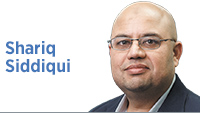Subscriber Benefit
As a subscriber you can listen to articles at work, in the car, or while you work out. Subscribe Now One of the five pillars of Islam is the practice of Zakat. Zakat is an obligatory Islamic charity that requires one to give 2.5% of one’s surplus wealth to eight broadly defined specific charitable causes.
One of the five pillars of Islam is the practice of Zakat. Zakat is an obligatory Islamic charity that requires one to give 2.5% of one’s surplus wealth to eight broadly defined specific charitable causes.
Eligible recipients of Zakat include the poor and the needy, Zakat collectors, orphans, widows, those to be freed from slavery, the aged who cannot work to feed themselves, those in debt and stranded travelers as well as efforts in the cause of God. How these categories are defined has changed over time and may differ from community to community or country to country.
Much of the discourse about Zakat is focused on the specific categories and how they can be defined on an individual level. There have been fewer discussions about the larger question of whether Zakat is a macroeconomic or microeconomic tool to help these eight categories.
Traditionally, Zakat was collected by the state into a central fund called the bait-ul-maal. But as disputes about who would lead the Muslim world increased and resulted in intra-Muslim warfare, there was growth in distrust of central government. Later this distrust was exacerbated by colonialism by foreign powers. The emergence of new countries (during the Cold War) continued to see greater distrust of the state and central institutions.
This distrust has impacted how Muslims have given their Zakat. There is a growing preference of giving informally directly to individuals. Research by Indiana University Lilly Family School of Philanthropy Muslim Philanthropy Initiative suggests that informal giving directly to beneficiaries is seen as a preferred way of donating Zakat in a number of Muslim-majority countries.
Muslims in the United States have been an important exception in this trend. Muslims in the United States (like most of their fellow nationals) give the vast majority of their philanthropy through not-for-profit institutions—even by those who do not benefit from tax deductions.
In my recent co-authored book, “Religion and Poverty: Monotheistic Responses Around the Globe,” I argue that it may be this microeconomic approach (individual to individual) rather than macroeconomic (giving collective through centralized funds) that Zakat is less effective in combating systemic poverty in Muslim-majority countries.
I do not argue that Zakat can only be collected by the state. Instead, I explore the idea that only not-for-profit organizations or institutions of specific sizes would be better equipped to collect and distribute Zakat systematically. The advantages of this macroeconomic approach include the ability to find broader solutions, the ability to attain greater subject-matter expertise on the challenges being faced and the economies of scale that larger-scale not-for-profits can achieve.
While there are advantages to larger organizations to better serve policy goals, we might also find that smaller grassroots and community organizations are more likely to further marginalized and underserved populations
I believe that Islamic law allows Muslims to give both formally and informally. However, I think it is important that Islamic religious scholars, social scientists and philanthropy practitioners discuss the advantages and limitations of macro- and microeconomic approaches to Zakat collection and distribution. A macroeconomic approach to implementing a Zakat system could unlock systemic solutions to poverty.
While Zakat may serve as a tool of macroeconomic policy and focus on long-term development, the Islamic charitable practice of sadaqah could continue to play the role of informal giving. Creating an eco-system that has both the flexibility of an informal sadaqah and the certainty of a Zakat system.•
__________
Siddiqui is assistant professor and director of the Muslim Philanthropy Initiative at the Lilly Family School of Philanthropy at Indiana University. Send comments to [email protected].
Click here for more Forefront columns.
Please enable JavaScript to view this content.
